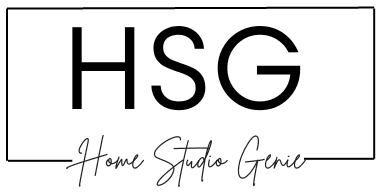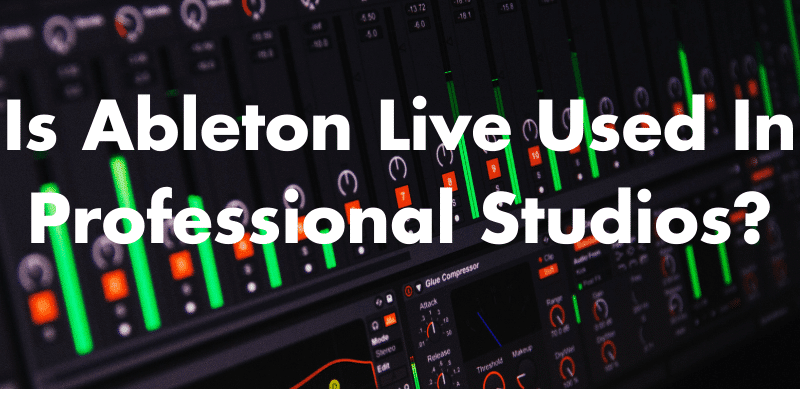Ableton Live is still one of the most powerful digital audio workstations around. It is not only intuitive and beginner-friendly but it can also be used as a professional DAW.
Many producers still wonder whether Live is respected in the music industry. This is because there are many other audio workstations to choose from.
In this article, we’re delving into whether Ableton Live is used in professional studios and how to set it up.
Let’s jump straight into it.
Is Ableton Live Used In Professional Studios?
Yes, Ableton Live works well in professional music studios for music production, mastering, or even live performances. It has the required tools and audio plugins to make working in a professional studio easy.
Professional music studios can be quite intimidating with the desks full of consoles with hundreds of knobs and buttons. However, at the basic level they all do pretty much the same thing, but at a larger scale.
Professional music studios basically take audio from a song and make it sound better for the final release. This can be done through Ableton Live, but the analog and physical audio processors will give a better result.
This can include mastering or the production phase itself and it must also have the ability to make music tracks from start to finish.
From a DAW like Ableton Live, you have multiple tracks such as a drum track, guitar track, and vocal track. These can be routed to the studio mixing console individually so that each one can be controlled without affecting the others.
Routing the individual tracks from Ableton to the mixing console lets you control how the final product will turn out. Sounds from Ableton are run through the analog mixing desk for a warmer sound.
DAWs have a tendency to sound a bit thin and not very professional. This is why professional music makers prefer big studios with a lot of capability.
Most computer-based musicians do all their composing and production on their computer with Ableton and then use a bigger studio later.
To connect to an analog mixing console on Ableton Live, you can use a USB cable from the computer to the mixing desk. The different channels and tracks will then be detected by the connection.
For example, say we have a drum kick on channel one on Ableton Live, then the analog mixing console will automatically allocate track one or channel one on the desk.
The drum kick will then be processed through the mixing desk to process gain, panning, or compression. From here on, you can choose where you want the processed audio to go.
The processed drum kick or group of tracks can then be routed back into Ableton Live for recording or to a different recorder. Most producers send the processed signal back into Ableton.
Can I Get A Warmer Sound In Ableton Live?
Yes, a warmer and bassy sound can be achieved with Ableton Live only. There are audio processing plugins that can achieve a warmer professional sound in Ableton Live.
It’s no secret that music processed through analog mixing consoles sounds warmer and fuller than with DAWs exclusively. Although this sound can now be produced by seasoned studio engineers using exclusively DAWs.
Digital music straight from a computer can sometimes sound tinny and thin without a fuller sound.
This is mostly because of using purely digital processing from plugins and the sound doesn’t have a hardware component to it. This can be why most beginners think their mixes sound “thin”.
This brings us to our next point on thin-sounding mixes when processed through Ableton or other DAWs.
EQ, saturation, reverb, and compression are your go-to solutions when looking for a warmer overall sound. Ableton has these plugins as stock in the Ableton Live 11 Suite version.

If you’re new to Ableton Live, a good way to get started is to try it out by downloading the Lite version. after some practice, you should be able to tell whether you can use it as your main DAW.
Why Do My Ableton Mixes Sound Thin And Raspy?
The most common cause of thin-sounding mixes is the lack of proper EQ and lack of frequency in specific areas. EQ can help you spread out the sound to different frequencies in order to fill out the spectrum.
A big mistake beginners do is not spreading out the different sounds in their mixes. Different sounds tend to clash if they are not given their own space to breathe.
A study by EDMProd also shows that beginners struggle a lot with where to start in their music production journeys.
Learning Ableton Live basics is a good start before focusing on the quality of your mixes. This will teach you to make songs faster and this practice will eventually result in better mixing skills.
If too many different sounds fill up a certain frequency, they are bound to fight over spectrum space. This ends up sounding muddy and thin because the sounds are fighting over each other.
Panning or compressing certain sounds can give them their own space in the mix and let them shine properly. Sounds fighting for the same frequency spectrum are called “Frequency Masking”.
Stereo sound is a marvel in these times because you have a whole space of surrounding spectrum space to use.
Panning different sounds left or right and adding reverb for a spacious feel has the effect of a warmer and fuller sound. There are plenty of plugins in Ableton Live that can pan, add reverb, and other effects.
If you’re happy with the overall EQ, you can choose to add more processing plugins that will give you a warmer sound.
Saturation plugins work to give an extra feeling of hardware and warmth to your sounds but should be used sparingly.
Unfortunately, you might have issues with Ableton Live itself, and this can result in your audio coming out thin or raspy. Common issues with Ableton Live can be solved by checking your setting and hardware for issues.
Do Professionals Use Ableton Live?
Yes, there are professional musicians from different genres who use Ableton Live exclusively for their song production. It is a versatile music software with a beginner-friendly interface and plenty of capability.
Ableton Live was designed with live performances in mind, and as such, the software will be suited for that reason. However, it is now used by professional musicians as their preferred DAW of choice.
Because of its versatility, Ableton is used throughout the music industry by pros of all kinds. You can find hip-hop producers and classical music artists using it.
Famous Producers Who Use Ableton Live
- LondonOnDaTrack
- Kenny Beats
- Timbaland
- Mike Dean
- David Guetta
- Skrillex
- Steve Aoki
- The Chainsmokers
Here’s a quick video of David Guetta using Ableton Live
This is a just a few of some famous acts that use Ableton, and some are from widely different genres of music. But it just goes to show how capable and intuitive this music-making software is.
An important note to remember is that making good music does not depend on which DAW you use. The software is just a tool to get your ideas to fruition as efficiently as possible.
Choosing a DAW depends on what kind of workflow you enjoy and what you want it to do. A live performer might choose a different DAW from an EDM artist because of workflow.
Is Ableton Good For Professional Studio Recording?
Absolutely! Ableton Live 11 Suite now comes with all the plugins and tools you are likely to need in a pro recording studio. You can choose to record straight to an external recorder or route the music back into Ableton.
When coupled with an analog mixing console, Ableton comes alive with a warm and crisp sound. You can then control all the different tracks directly from the mixing desk.
Even though Pro Tools might seem like the industry standard for professional studio work, more DAWs are now cutting in. Companies are branding their software as all-in-one systems that can handle everything from start to finish.
Ableton Live 11 Suite version is best if you’ll be working in a professional studio a lot. This is the full package version for Ableton and will have almost everything you need.
If you need more functionality, you can always install third-party plugins that support Ableton Live 11. Sometimes Ableton Live will have a simplified version of a plugin, so a third-party plugin might offer more features.
When working in a pro music studio it is good practice to save your work often. There are a lot of cables involved in hardware setups and signals might be lost between the computer and the mixing desk.
A lot of professional music studio managers will help you out when connecting your computer to the studio. In many instances, producers bring their laptops to the studio so they can connect their own DAW.
However, a good studio will have a spare computer you can use to import all your song projects into the studio setup. In many cases, this will be a powerful computer that has a lot of well-known DAWs and plugins.

Mike is a skilled musician, guitar technician, and music producer with a passion for audio and gear. He excels in teaching guitar, editing podcasts/videos, and creating captivating soundscapes using cutting-edge hardware, software, and plugins. Mike’s talent and commitment make him highly sought-after in the industry, inspiring fellow musicians worldwide.


